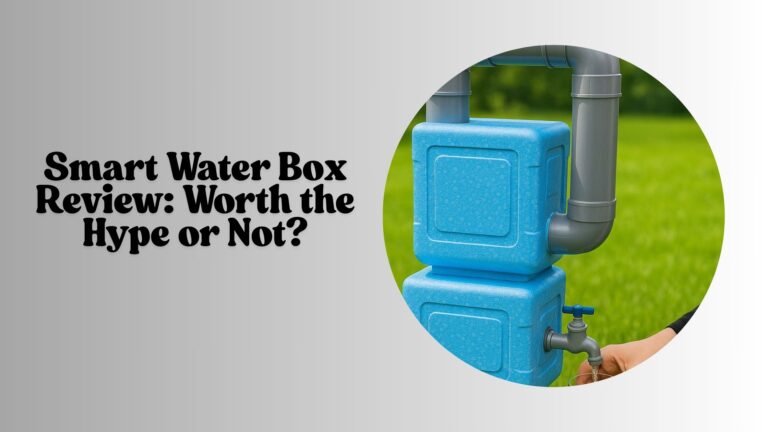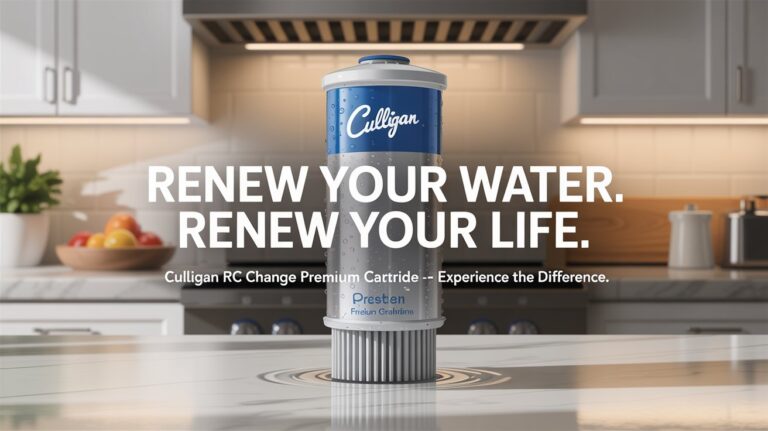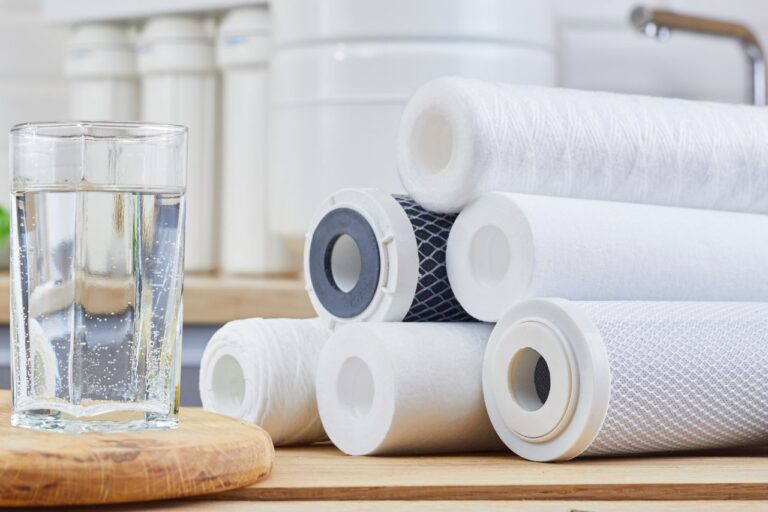6 Noises Your Water System Makes—and What They Mean
Have you ever been startled by strange sounds coming from your plumbing system? You’re not alone. Unusual noises can be unsettling, and understanding their meaning is crucial for maintaining your water system.
Identifying the source of these sounds is the first step in ensuring your plumbing system operates efficiently. In this article, we’ll explore common noises made by water systems and what they signify.
Key Takeaways
- Understanding water system noises is crucial for maintenance.
- Different sounds can indicate various issues.
- Identifying the source of the noise is the first step in resolving the issue.
- Regular checks can help prevent major problems.
- Knowing what the noises mean can save you money.
Understanding Your Home’s Water System
A typical residential water system consists of several key components, and understanding these can help you make sense of the noises it makes. The system is made up of pipes, valves, and fixtures that work together to supply water throughout your home.
Components of a Residential Water System
The main components include the water supply lines, distribution pipes, valves, and fixtures such as faucets and toilets. Each of these parts plays a crucial role in the functioning of your water system. For instance, valves control the flow of water, while fixtures are the endpoints where water is used.
Why Water Systems Make Noise
Noise can be a normal part of a water system’s operation. Sounds like gurgling, banging, or whistling can occur due to the flow of water, pressure changes, or the system’s design. However, these noises can also indicate potential issues that need to be addressed.
The Impact of Water Quality on Your Plumbing
Water quality can significantly affect your plumbing system. Hard water, for example, can lead to mineral buildup in pipes, reducing efficiency and potentially causing noise. Understanding the quality of your water can help you take preventive measures to protect your plumbing.
By grasping the basics of your home’s water system, you can better understand the noises it makes and take appropriate action when necessary.
When to Be Concerned About Plumbing Noises
Distinguishing between harmless and problematic plumbing noises is essential for homeowners to avoid unnecessary expenses and stress. Your home’s plumbing system is complex, and various noises can occur due to different reasons.
Normal vs. Abnormal Sounds
Some noises, like a slight humming when you turn on the faucet, are normal. However, loud banging or clanking sounds are not typical and may indicate a problem. It’s crucial to identify the source of the noise to determine the appropriate action.
The Importance of Addressing Unusual Noises Quickly
Ignoring unusual noises can lead to more severe issues, such as leaks or pipe damage. Promptly addressing these noises can help prevent costly repairs down the line.
How Ignoring Noises Can Lead to Costly Repairs
Failing to address plumbing noises can result in significant financial burdens. For instance, a small leak can lead to water damage, mold growth, and the need for extensive repairs.
| Noise Type | Possible Cause | Recommended Action |
|---|---|---|
| Loud Banging | Water Hammer | Check for loose pipes or install a water hammer arrestor |
| Whistling or Squealing | High Water Pressure | Regulate water pressure or check for faulty valves |
| Gurgling or Bubbling | Air in the System or Clogged Drains | Check for blockages or bleed air from the system |
Noise #1: Hammering or Banging
The sudden, loud hammering or banging noise in your pipes is not just annoying; it’s a sign of an underlying issue that needs to be addressed. This phenomenon, known as water hammer, can be caused by sudden changes in water flow.
What Causes Water Hammer
Water hammer occurs when there’s a sudden stop in water flow, typically when a valve closes quickly. This can cause a shockwave that travels through the pipes, resulting in the banging or hammering noise.
Potential Damage from Water Hammer
If left unchecked, water hammer can lead to significant damage to your plumbing system. The repeated shockwaves can loosen pipe fittings, damage valves, and even cause pipes to burst in severe cases.
How to Fix Hammering Sounds
Fortunately, there are effective solutions to fix hammering sounds. Two primary methods include installing water hammer arrestors and securing loose pipes.
Installing Water Hammer Arrestors
Water hammer arrestors are devices that absorb the shockwave caused by the sudden stop in water flow. They are typically installed near the source of the water hammer and can significantly reduce the noise.
Securing Loose Pipes
Loose pipes can exacerbate the noise caused by water hammer. Securing these pipes with appropriate mounting hardware can help minimize the movement and reduce the noise.
By addressing the causes of water hammer and implementing these solutions, you can fix your noisy water system and prevent potential damage. Regular maintenance and inspections can also help in identifying and resolving issues before they become major problems, providing effective water system noise solutions.
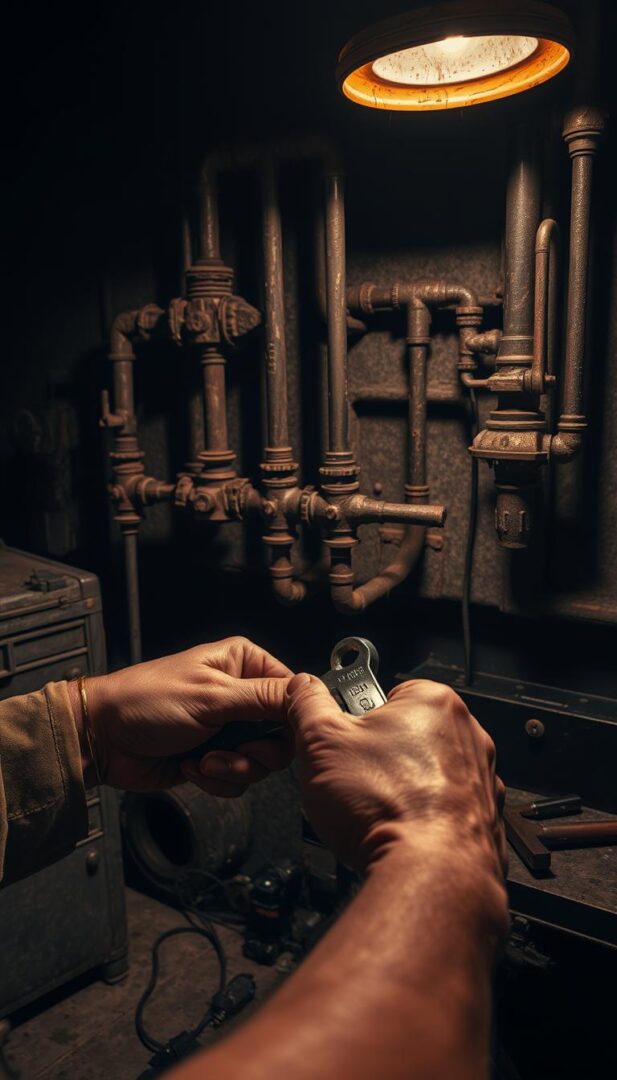
Noise #2: Whistling or Squealing
Whistling or squealing sounds emanating from your water system are not only annoying but also indicative of potential issues. These noises can be caused by a variety of factors, including high water pressure and faulty valves.
High Pressure Issues
High water pressure is a common cause of whistling or squealing noises. When the pressure is too high, it can cause the pipes to vibrate or the water to flow too quickly, resulting in these unwanted sounds. High pressure can also lead to more severe problems, such as leaks or pipe damage.
Valve Problems That Cause Whistling
Faulty or worn-out valves can also be the culprit behind whistling or squealing noises. Valves that are not functioning correctly can cause turbulence in the water flow, leading to these sounds. It’s essential to inspect your valves regularly to ensure they’re working properly.
Solutions for Whistling Pipes
Fortunately, there are several solutions to address whistling or squealing pipes. Two effective methods include adjusting the pressure regulator and replacing worn-out valves.
Pressure Regulator Adjustments
Adjusting the pressure regulator can help alleviate high pressure issues. By lowering the pressure to a safe level, you can eliminate the whistling or squealing noise. It’s crucial to consult a professional if you’re unsure about how to adjust the regulator.
Replacing Worn Valves
If the issue is with the valves, replacing them can resolve the problem. It’s essential to choose the right type of valve for your plumbing system to ensure proper function and prevent future issues.
| Cause | Solution | Benefit |
|---|---|---|
| High Water Pressure | Adjust Pressure Regulator | Reduces Noise and Prevents Damage |
| Faulty Valves | Replace Worn Valves | Eliminates Turbulence and Noise |
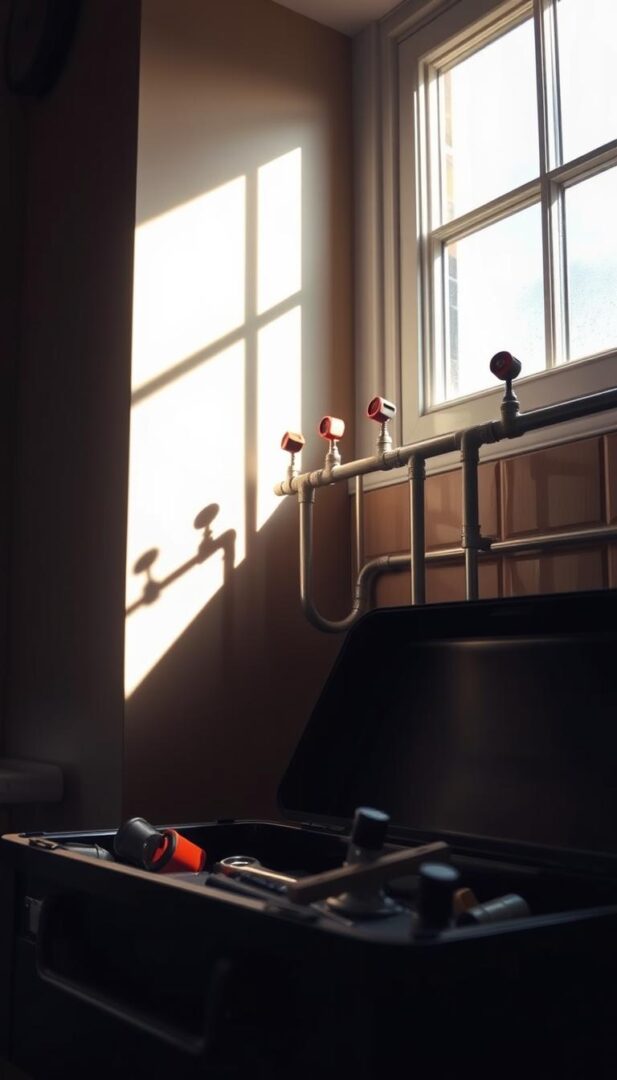
By addressing the root cause of the whistling or squealing noise, you can restore peace to your home and prevent potential damage to your water system. Regular maintenance and inspections can help identify issues before they become major problems.
Noise #3: Gurgling or Bubbling
Gurgling or bubbling noises coming from your water system can be more than just annoying; they often signal underlying issues that need attention. These sounds can be indicative of problems within your plumbing system, ranging from issues with drains and vents to air trapped in the water lines.
Drain and Vent Issues
One of the primary causes of gurgling or bubbling noises is related to drain and vent issues. When your drain lines are clogged or your vent pipes are blocked, it can create a negative pressure environment that pulls air into the system, resulting in these noises. Common causes include:
- Clogged drain lines due to debris or grease buildup
- Blocked vent pipes that prevent air from escaping
Air in the Water Lines
Air trapped in the water lines is another reason for gurgling or bubbling sounds. This can happen due to improper bleeding of the system after maintenance or repairs, or due to leaks that allow air to enter. It’s crucial to identify and fix any leaks to prevent further complications.
Fixing Gurgling Sounds
To address gurgling or bubbling noises, you need to identify and fix the underlying cause. This might involve clearing blockages or addressing vent issues.
Clearing Drain Blockages
To clear a clogged drain, you can use a plunger or a drain snake. For more severe blockages, consider using a chemical drain cleaner or calling a professional.
Addressing Vent Problems
For vent problems, inspecting the vent pipes for blockages or damage is essential. You may need to clear debris or repair damaged sections to restore proper function.
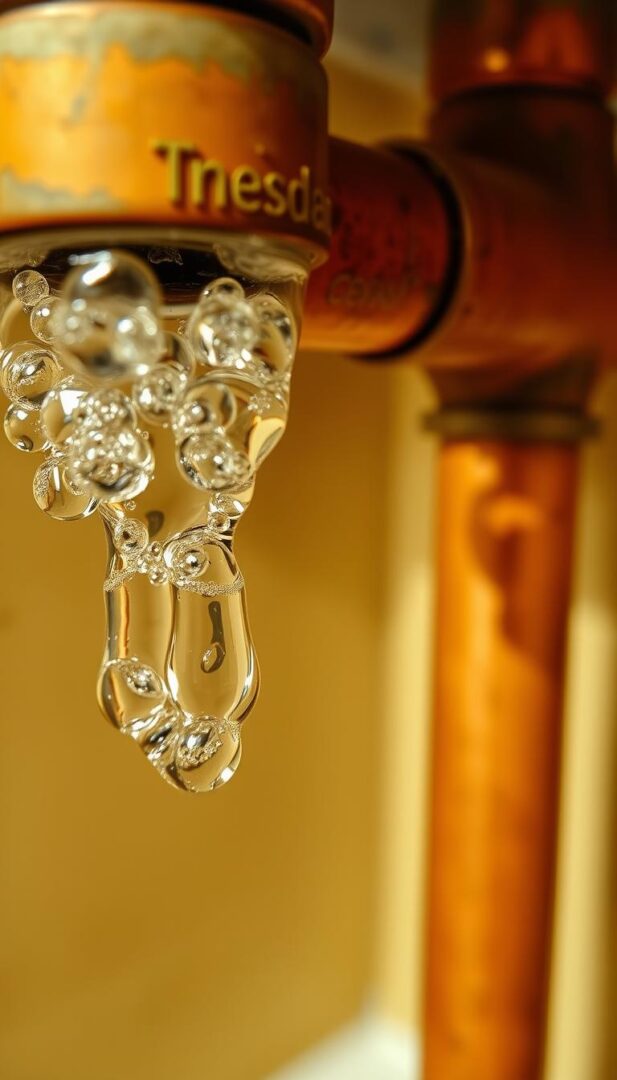
By understanding the causes of gurgling or bubbling noises and taking appropriate action, you can resolve these issues and maintain a healthy, quiet plumbing system.
Noise #4: Ticking or Tapping
The sound of ticking or tapping in your plumbing system is often related to thermal expansion, a phenomenon that can be managed with the right knowledge.
Thermal Expansion Explained
Thermal expansion occurs when pipes heat up and expand, causing them to move and sometimes make noise. This is a normal process, but it can become problematic if not managed properly.
As water flows through the pipes, it can cause the pipes to heat up or cool down, leading to expansion or contraction. This movement can result in ticking or tapping sounds, especially if the pipes are not properly secured or insulated.
When Ticking Is Normal vs. Problematic
Occasional ticking noises due to thermal expansion are generally normal and not a cause for concern. However, if the ticking is persistent, loud, or accompanied by other symptoms like leaks or water damage, it may indicate a more serious issue.
Managing Pipe Expansion Noises
To manage ticking or tapping noises caused by thermal expansion, homeowners can consider a couple of effective solutions.
Insulation Solutions
One way to reduce the noise is by insulating the pipes. Proper insulation can help minimize the expansion and contraction of pipes, thereby reducing the ticking sounds.
Expansion Tanks and Their Benefits
Another solution is the installation of expansion tanks. These tanks provide a cushioning effect, absorbing the expansion and contraction of water within the plumbing system, thus reducing the strain on the pipes and minimizing noises.
| Solution | Description | Benefits |
|---|---|---|
| Insulation | Wrapping pipes with insulating material | Reduces pipe expansion and contraction, minimizing noise |
| Expansion Tanks | Installing tanks to absorb water expansion | Reduces strain on pipes, minimizes noise, and prevents damage |
By understanding the causes of ticking or tapping noises and implementing the right solutions, homeowners can effectively manage these sounds and maintain a quieter, more efficient plumbing system.
Noise #5: Rattling or Vibrating
Rattling or vibrating noises emanating from your water system can be more than just a nuisance; they often signal underlying issues that need attention. These sounds can be caused by a variety of factors, including loose pipe supports and water pressure fluctuations.
Loose Pipe Supports and Mounting
One of the primary causes of rattling or vibrating noises is loose pipe supports. When pipes are not securely fastened, they can move and cause noise as water flows through them. Ensuring that pipes are properly supported can significantly reduce these noises.
Water Pressure Fluctuations
Water pressure fluctuations can also lead to rattling or vibrating noises. High or fluctuating water pressure can cause pipes to vibrate or shake, leading to the noises you hear. Monitoring and adjusting your water pressure can help mitigate these issues.
How to Secure Loose Pipes
Securing loose pipes is a relatively straightforward process that can greatly reduce rattling and vibrating noises. Two effective methods include using pipe hangers and straps, and utilizing cushioning materials for noise reduction.
Using Pipe Hangers and Straps
Pipe hangers and straps are designed to keep pipes in place, preventing the movement that causes noise. By installing these supports, you can significantly reduce rattling and vibrating.
Cushioning Materials for Noise Reduction
Cushioning materials, such as pipe insulation, can also be used to reduce noise. These materials absorb the vibration and movement of pipes, leading to a quieter water system.
By addressing the causes of rattling or vibrating noises, you can not only reduce the disturbance but also potentially prevent more serious issues with your water system. Effective water system noise solutions often involve a combination of securing loose pipes and troubleshooting underlying issues like water pressure fluctuations.
As emphasized by experts, “Identifying and addressing the root cause of the noise is crucial for effective water system troubleshooting.” By taking proactive steps to secure your pipes and adjust your water pressure, you can enjoy a quieter, more efficient water system.
Noise #6: Running Water When Nothing’s On
Running water sounds when nothing’s on can indicate a hidden problem in your plumbing system. This issue not only wastes water but can also lead to increased water bills and potential damage to your home.
Toilet Leaks and Running
One common cause of running water sounds is a toilet leak. Toilets can leak due to a faulty flapper or an improperly adjusted float. To check for leaks, you can perform a simple dye test.
Dye Testing for Toilet Leaks
To perform a dye test, add a few drops of food coloring to the tank and wait for about 30 minutes without flushing. If the color appears in the bowl, you have a leak.
Hidden Leaks in Walls
Hidden leaks behind walls or under floors can also cause the sound of running water. These leaks can be due to cracked pipes or loose connections.
Using Moisture Meters to Locate Hidden Leaks
Moisture meters can help detect hidden leaks by measuring the moisture levels in walls and floors. This can help you identify the source of the leak before it causes significant damage.
Water Meter Check for Leaks
Another method to detect leaks is by checking your water meter. Turn off all faucets and water-using appliances, then check the meter. If it’s moving, you likely have a leak somewhere in your system.
| Method | Description | Usefulness |
|---|---|---|
| Dye Testing | Adding dye to the toilet tank to check for leaks | High |
| Moisture Meters | Measuring moisture levels in walls and floors | High |
| Water Meter Check | Monitoring the water meter for movement | Medium |
By identifying and fixing these leaks, you can improve your water system and reduce unnecessary water loss. Regular checks and maintenance can help prevent such issues, ensuring your plumbing system operates efficiently.
6 Noises Your Water System Makes—and Preventative Maintenance
Understanding the importance of preventative maintenance can help you address the six noises your water system makes before they become serious issues. Regular maintenance is key to preventing plumbing problems and ensuring your water system operates efficiently.
Regular Inspection Schedule
Establishing a regular inspection schedule is crucial for identifying potential issues before they escalate. Check your pipes, fittings, and appliances regularly for signs of wear or damage. This proactive approach can help you catch problems early, reducing the risk of costly repairs.
Water Pressure Monitoring
Monitoring your water pressure is another vital aspect of preventative maintenance. High water pressure can cause pipes to bang or rattle, while low pressure can lead to poor appliance performance. Use a pressure gauge to check your water pressure, and consider installing a pressure regulator if necessary.
Seasonal Maintenance Tips
Seasonal changes can impact your water system, making it essential to adjust your maintenance routine accordingly. Here are some seasonal tips to keep in mind:
Winter Preparation for Pipes
Before winter sets in, insulate exposed pipes in unheated areas like the garage, basement, or crawlspace. Disconnect and drain hoses from outdoor faucets to prevent freezing.
Summer Water System Care
During the summer, check your irrigation system for leaks or damage. Inspect your water heater for signs of wear and ensure it’s functioning properly.
By following these preventative maintenance tips, you can help ensure your water system operates smoothly and efficiently, reducing the likelihood of plumbing problem sounds.
DIY Fixes vs. When to Call a Professional
Understanding when to DIY and when to call a professional is key to effectively addressing water system noises. While some plumbing issues can be resolved with simple fixes, others require the expertise of a qualified plumber.
Simple Repairs You Can Do Yourself
Many common issues, such as loose pipe connections or clogged aerators, can be fixed without professional help. For instance, tightening loose pipes or replacing worn-out washers can often resolve banging or clanking noises. Regular maintenance, like checking and replacing worn-out parts, can prevent many issues.
Essential Tools for DIY Plumbing Repairs
Having the right tools is essential for DIY plumbing repairs. Basic tools include a pipe wrench, adjustable wrench, and pliers. Investing in a good quality toolset can make a significant difference in the ease of DIY repairs.
Warning Signs That Require Professional Help
Certain signs indicate the need for professional assistance. These include persistent or loud noises, signs of leaks, or water damage. If you’re unsure about the cause of the noise or how to fix it, it’s best to consult a professional.
Finding a Qualified Plumber
When you need to call a professional, finding a qualified plumber is crucial. Look for licensed plumbers with good reviews and experience with your type of plumbing system. Asking for referrals from friends or family can also help you find a reliable plumber.
By knowing when to attempt a DIY fix and when to call a professional, you can effectively fix noisy water system issues and ensure your plumbing operates smoothly.
Conclusion
Recognizing the 6 noises your water system makes and their meanings is crucial for maintaining a healthy plumbing system. By understanding the causes of these sounds, homeowners can take proactive steps to prevent costly repairs.
Addressing unusual water system sounds promptly can save homeowners from unexpected expenses. Regular maintenance, inspections, and monitoring water pressure can help identify potential issues before they become major problems.
By being aware of the water system sounds meanings, homeowners can take control of their plumbing system’s health. This knowledge enables individuals to distinguish between normal and abnormal sounds, ensuring timely interventions and prolonging the system’s lifespan.





